Eucharist: The Sacrament of Reconciliation and Justice
Katerina PEKRIDOU
I. The Centrality of Eucharist in the Life of Christian Churches
All Christian churches, diverse as they are in terms of culture, language, liturgical expression and political background, emphasise the significance of the Eucharist whether they reflect on liturgical and ecclesial life, or examine the Church in its charismatic and institutional aspects, its mission in the world and the social sphere, and its relationship with other churches.1
The eucharistic assembly is at the heart of ecclesiology of communion: The Church is the communion of believers with other believers, God and creation in the Body of Christ; a communion actualised through the power of the Holy Spirit. By virtue of their faith and baptism, the believers are members of this Body, whose fullness is expressed in the eucharistic celebration of the local church.
The Church as communion of churches is revealed in the eucharistic assembly, and its structure is fulfilled in it. Ministry is meaningless apart from the eucharistic assembly. All church ministries and institutions find their meaning in the eucharistic context.
The Church of God is a communion in all its aspects. Nothing in ecclesial life and structure can escape communion. The Church is a communion of grace, life, hope and mission. Every facet of this communion is relational. The identity of the Church itself is relational, since it can be conceived only in relation to God and to a certain locality.2
II. Eucharist as the Sacrament of Unity and Reconciliation with God, Men and Creation
The Eucharist as experienced in the Church is the revelation of the Kingdom of God in the present and at the same time a movement towards the Heavenly Kingdom. It is a gift of God that nourishes the life of the Church. This gift – as the name of the Eucharist itself implies – is received in thanksgiving. The Eucharist is the continuing revelation of the mystery of Godself, which is Communion (three distinct persons in one nature). The entering of men and women into the divine communion that the gospel proclaims is made real in the eucharistic meal.
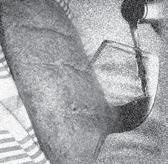
In the ecclesial event of the Eucharist the bread and wine along with the community itself are offered to God the Father. The Holy Spirit is invoked for both the consecration of the gifts and
Aikaterini Pekridou (katerina) studied orthodox Theology in Greece and continued her studies with an emphasis on ecumenical Theology in the Holy Cross Greek orthodox School of Theology, Brookline MA, uSA. At the moment, she is a Phd candidate at the department of Theology of the Aristotle university of Thessaloniki in the area of Missiology and ecumenical Theology. katerina is member of the Volos Academy for Theological Studies of the Metropolis of demetrias. She is currently working with the Faith and order Commission of the World Council of Churches as an intern.
33
the realisation of the unity of the community. God’s response to the epiclesis (the invocation) is the transformation of the elements and lives of the partakers of the Body of Christ through the Spirit of the resurrection. His response is the actualization of communion of the community and the whole creation with the Triune God in Jesus Christ through the power of the Holy Spirit. 3
In the New Testament the theme of the Body (Rom. 12:3-6, 1Cor. 12:4-27) is extensively used to indicate the organic union and the solidarity of the community. The believers become the one and single Body of Christ (1 Cor. 10: 14-17) that is the Church. The internal unity of the members comes from the fact that they are all (each one in their uniqueness and singularity) gathered into the one and indivisible Body of Christ in whom all kinds of division and injustice are transcended (Gal. 3:28), as long as the members have forgiven one another before offering their prayers to God (Matt. 5:23-26).4
The believers are introduced by the Holy Spirit into communion with the body of the risen Christ and at the same time with other believers, who are members of the same body no matter what their ethnic, social and economic background may be. The Church finds its full reality only in the eucharistic mystery, where men and women that the Spirit brings into existence are reconciled in the body of the Lord. In that sense the Eucharist makes the Church, it builds up the community of Christ, the body in which all humanity is reconciled.5
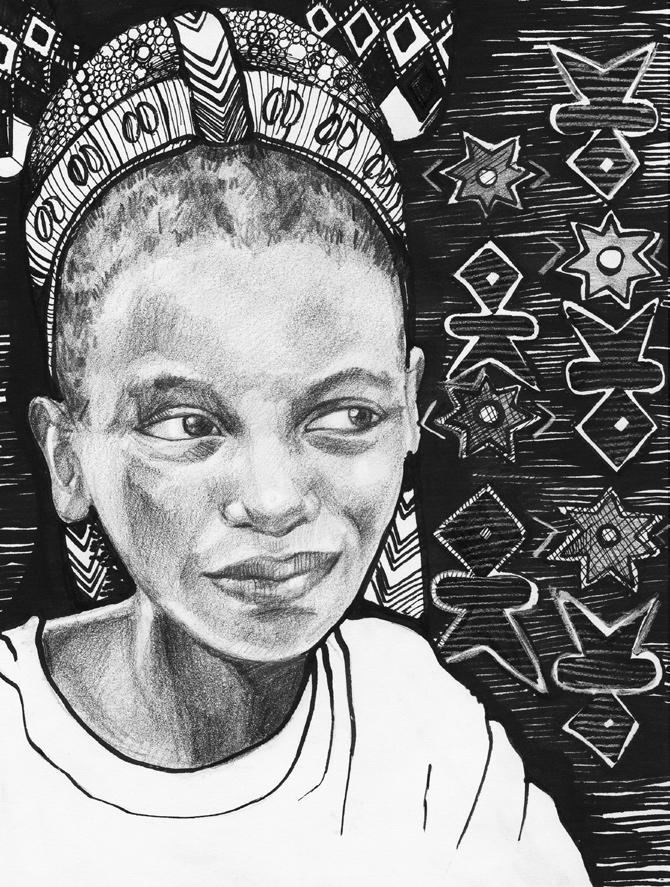
34 A Just Life or just life? – Katerina
Sacrament of Reconciliation and Justice
PEKRIDOU: Eucharist – The
This is what the Church believes and teaches. This is the faith proclaimed in the world, but is it really what the Church experiences? Is it something we know in our everyday lives?
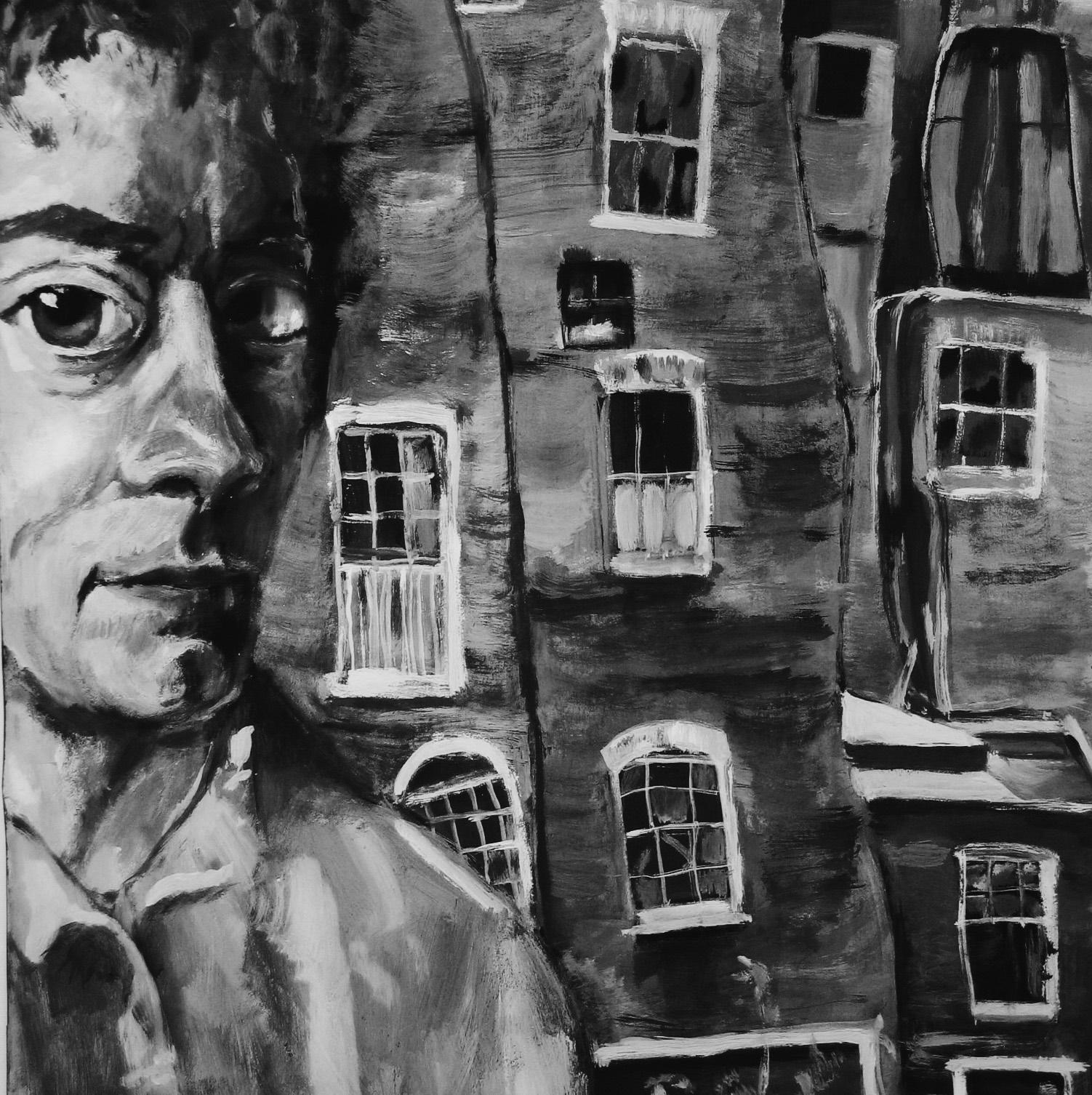
35
III. Eucharistic Theology contradicting with everyday Life and Experience
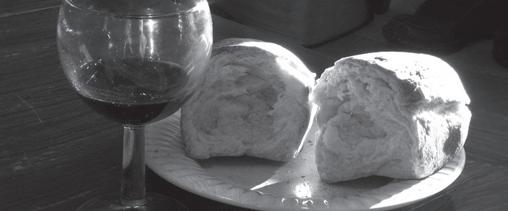
This is what the Church believes and teaches. This is the faith proclaimed in the world, but is it really what the Church experiences? Is it something we know in our everyday lives? Does the justice and peace that we taste in the eucharistic gathering extend into our social relationships? Do we bear the wounds of our world in the Body of Christ and do our celebrations promise the healing of the inequalities and violence that injure human dignity? Having received the gift of consecrated bread and wine do we demonstrate a respect for the sanctity of creation? Each day we experience a tragic absurdity, the inconsistency between our theology and actions. We constantly pray, ‘Thy kingdom come,’ yet do we actively participate in the ongoing transformation of human life and the renewal of creation?6
The Church has always emphasized three inseparable sacramental ways of knowing and communicating God: proclamation of the gospel, participation in the eucharistic feast, active compassion and care for the poor and in need. Whenever one of those constitutive aspects of Church life is not adequately emphasized, the life and witness of the Church suffers.7 Moreover, the mistreatment and rape of nature that totally denies the sanctity of the natural environment and disregards how human beings are part of creation, constitutes another symptom of our spiritual illness.8
For the Church to remain faithful to its mission in the world, it has to mirror the communion of persons that exists in the Triune God9 and witness to the world concerning the
transformation experienced in the Eucharist. As the priests imitate the liturgical gestures of Christ when they offer the Eucharist on behalf of the whole community, we have to imitate his life and social action.
IV. Demonstrating the Unity experienced in the Eucharist in contemporary Society
This means that as long as we live in time and space as historical beings, we have to actively participate in the humanisation process.10 Our mission in the world is to stand on the side of the poor, the oppressed and the marginalised, and at the same time to protect and preserve creation. Struggle for human rights, social justice, peaceful co-existence and integrity of creation is a demand, as well as a sign of the authentic worship of God.
This sending out of each Christian to the contemporary society, often called “the liturgy after liturgy”,11 is not limited only to the proclamation of just peace in the world. On the contrary, it is the clear declaration that the Church cannot be tolerant to any kind of injustice, oppression and abuse any more. In this perspective, not only do we have to work for reconciliation and healing,12 but also denounce all kinds of injustice and violence.
The WSCF thematic conference “A Just Life or just life? Intercultural Dialogue on Alternative Globalisation” emphasised that in order for Christian communities and individuals to be effective, concrete action has to be taken. On a personal and also local level, we could start by knowing, loving and caring for our own community, the specific place where we are located and the community for whose people, nature and needs we have affection. In the
36 A Just Life or just life? – Katerina PEKRIDOU: Eucharist – The Sacrament of Reconciliation and Justice
Kevin RAWL in GS
particular place to which we are related in a personal way, we can love and care for every other place and community.13
Within our local context, we could raise awareness on the economy that is based on cooperation, reciprocity and solidarity, just trade and finance, and just interaction between humanity and creation14 by discussing the issues in our SCMs or other student groups, in bible studies, worships and film nights, and acting them on in campaigns and workshops along with other student bodies, by buying fair trade products and encouraging others to buy them as well.
The conference raised these ideas for concrete actions that can be related to the liturgy:
To be well informed and to inform others by publishing » articles or creating websites – should we not also make these concerns part of public preaching?
To choose one campaign and support it or to become » active in an organization; to support blood and organ donation; to recycle everything – should we not also begin by taking the Gospel values as a ‘rule of life’ and form base communities?
To display the fair trade sign, to wear clothes with a » message, to become less materialistic – should we not also consider how the Gospel, Christ, and our churches are the brands, slogans, symbols and places of an alternative culture of hospitality, creativity and friendship?
To form a group to help homeless children, to involve » at least one of your friends in the process; to buy two loaves of bread and give one away – could the church offering and the church community become a way of sharing our gifts of time and money and become ways of being accountable for the spiritual use of these gifts? Indeed the Eucharist reminds us that our creativity, talents and material goods are gifts from God and we use them wisely when they assist our human maturity and sharing.
We can all take action using our creativity and the talents of our community. By this action we can participate in God’s mission for the restoration of human nature and the renovation of Creation. Our individual contributions to social justice and renewal are all part of God’s continuing work of reconciling the universe, human beings together with creation in the dynamic life of the Spirit.
Endnotes
1 See the Baptism, Eucharist and Ministry document, Faith and Order paper No 111, WCC, Geneva, 1989, 10-17, and The Nature and Purpose of the Church, A stage on the way to a common statement, Faith and Order paper No 181, WCC, Geneva, 1998.
2 For communion ecclesiology see J.-M. R. TILLARD, Church of Churches: The ecclesiology of Communion, Liturgical Press, Collegeville, 1992 and J. D. Zizioulas, Euharist, Bishop, Church, The unity of the Church in the Divine Eucharist and the Bishop during the first three centuries, Elizabeth THEOKRITOFF (translator), Holy Cross Orthodox Press, Brookline, 2001, as well as his Being as Communion: Studies in Personhood and the Church, Darton, Longman & Todd, London, 1985.
3 Petros VASSILIADIS, Eucharist and Witness, Orthodox Perspectives on the Unity and Mission of the Church, WCC Publications, Geneva, Holy Cross Orthodox Press, Brookline MA, 1998, esp. p. 47-66; J.-M. R. TILLARD, Church of Churches, The ecclesiology of Communion, R. C. De PEAUx, O. PRAEM. (translator), Liturgical Press, Collegeville, Minnesota, 1992 , 23.
4 Petros VASSILIADIS, Eucharist and Witness, Orthodox Perspectives on the Unity and Mission of the Church, WCC Publications, Geneva, Holy Cross Orthodox Press, Brookline MA, 1998, esp. p. 47-66; J.-M. R. TILLARD, Church of Churches, The ecclesiology of Communion, R. C. De PEAUx, O. PRAEM. (translator), Liturgical Press, Collegeville, Minnesota, 1992 , 23.
5 J.-M. R. TILLARD, Church of Churches, 24-28; J. D. ZIZIOULAS, The ecclesiological presuppositions of the Holy Eucharist, available on www.resourcesforchristiantheology. org; see also Paul MCPARTLAN, The Eucharist makes the Church, Henri de Lubac and John Zizioulas in Dialogue, S. J., T&T Clark, Edinburgh 1993.
6 See BEM document, p. 14.
7 Emmanuel CLAPSIS, The image of Christ in the Poor, published by International Orthodox Christian Charities, www.iocc.org/greatlent2005.
8 See Emmanuel CLAPSIS, “Population, Consumption and the Environment” in the volume Orthodoxy in Conversation, Orthodox Ecumenical Engagements, WCC Publications, Geneva, Holy Cross Orthodox Press, Brookline MA, 2000, p. 209-215.
9 J. D. ZIZIOULAS, Communion and Otherness, SVTQ 38, no 1, 1994, p. 352- 353.
10 Athanasios N. PAPATHANASIOU, “Evangelization and Social Justice, An outlook into history” in his Future, the Background of History, Essays on Church mission in an age of Globalization, Alexander Press, Montréal Québec Canada, 2005, p. 86-97.
11 Anastasios YANNOULATOS, Mission in the traces of Christ (in greek), Apostoliki Diakonia Publications, Athens, 2007, p. 129-132; Ion Bria-Petros Vassiliadis, Orthodox Christian Witness (in greek), Tertios Publications, Katerini, 1989, p. 65-76.
12 See Participating in God’s Mission of Reconciliation, A Resource for Churches in Situations of Conflict, Faith and Order Paper 201, WCC Publications, Geneva, 2006.
13 See the interesting views of Mary Jo LEDDY in Radical Gratitude, Orbis Books, Maryknoll, New York 2005, esp. p. 168- 169.
14 For information on the economy of solidarity and the economy of life read Alternative Globalization Addressing Peoples and Earth, (AGAPE), A Background document, Justice, Peace and Creation Team, World Council of Churches, Geneva, 2005; see also Aruna GNANADASON, Listen to the Women!: Listen to the Earth!, WCC publications, Geneva, that is on the stewardship of creation.
37
Our mission in the world is to stand on the side of the poor, the oppressed and the marginalised, and at the same time to protect and preserve creation.
The Freedom of Radical Obedience
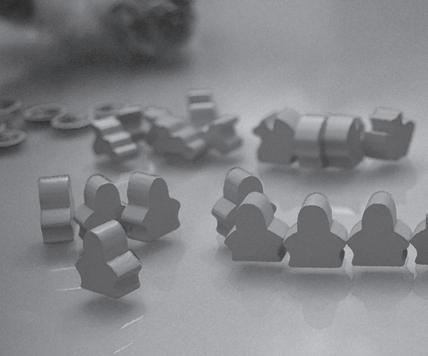 Matt Gardner
Matt Gardner

Probably one of the most damning indictments of our modern cullture’s obsession with freedom is that it’s a name we even give to our wars. Like other concepts which become removed from their context and valued in an absolute manner, freedom can become a very dangerous tool – being free from all forms of control and domination (and increasingly, free from ‘offence’) soon means being free to control, dominate or offend others. Absolute freedom has no end beyond itself, but as John MiLton recognised in the 17th century (just as the great era of privatisation and individualism was dawning), freedom that is not directed towards virtue is not freedom but merely licence, ‘which never hath more scope or more indulgence than under tyrants’. this utilitarian definition of freedom, where everybody is free to do whatever they like ‘so long as it doesn’t interfere with anyone else’, poses huge problems for all modern human politics. But perhaps the place in which it comes unstuck most spectacularly is the way we treat our natural resources and damage our environment. For if there is one thing the increasing environmental awareness of the last 20-30 years has shown us, it is that we are incapable of ‘not interfering’ with our environment, and if there is one thing that the processes of globalisation over the same period have shown us, it is that ‘our environment’ includes the whole planet. All animal and plant life, the atmosphere, soil, sea, rocks and desert – all are created as one interconnected community. in this context then, our neat Enlightenment concept of freedom as essentially amoral, individual and privatised breaks down. other
people do not merely exist as restrictions to my freedom, and neither does the rest of the natural world. We need to learn that true freedom comes not from asserting ourselves over each other and over nature, occasionally banding together to lobby on shared agendas, but from learning to cooperate and co-exist in community. this means discourse based on ‘needs’ rather than ‘rights’ and the acknowledgement that human will is not the most powerful force in the universe. operation Enduring Freedom, the name given by the US military to their response to the 11/09/01 attacks, was originally called operation infinite Justice. the name was changed to avoid offence to Muslims (for whom only God, the Al-‘Adl, is Utterly Just) but the blasphemy and presumption remains. For, paradoxically, true freedom is not to be found in the separation of violence and individualism, but in community, islam (submission) and radical obedience to laws not of our own making.
MOZAIK 22 38
Matt has studied music and theology and is the Administrator of SCM UK and ERC Treasurer.
Play Shadows of an Unsettling Reality
Roderick MORGAN & Jooa VUORINEN

The Experience
“It is not a secret that I threatened to blow up the President of the World Trade Organisation. As a result my country could not attend the next WTO meeting due to increased security precautions, and the poverty among my people increased. Crime also increased.
“This is what happened: my country produced rice and generic medicine, the latter bringing us the scarce livelihood. We worked hard to earn enough money to attend the WTO meeting, which had to decide between registering patents to original medicines or setting a safety-standard for each product sold in the international market.
“The rich countries, who were the majority of voting delegates and who all produced original medicines, voted for the patent. Who cares about safety anyway?
“Instantly, I knew what the decision meant: we had lost our largest source of income. All we were left with was slow and unprofitable rice production. I was so angry (I wouldn’t have ever done it, honestly!) that I threatened the WTO President in the media: he must ensure that no more decisions abolishing the economy of poor countries are made or else he will be blown up.
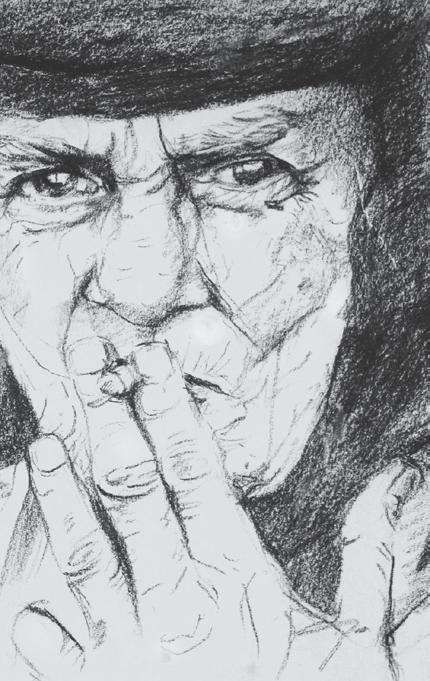
“The rest is history. At the next WTO meeting, we were not allowed to attend, nor were any other poor countries. As a consequence of the decisions made during the meeting, half of our production units were closed. In the game, we lost
the scissors used for cutting the paper templates that represented our products.
“Despair brings solution: we stole new scissors (we had stolen the pens needed for production before and thus did not need more), established a secret factory (with no regulations or labour control) outside the conference room and clipped away.
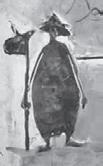 Jooa VUORINEN was born in North Carelia, Finland, in 1981. She studied theology at the University of Joensuu and graduated with master’s degree in 2005. She has been working as the European regional secretary of WSCF since January 2008.
Roderick MORGAN was born in the Welsh Valleys in 1989. He reads Peace at Bradford University and is in his second year. He campaigns on behalf of Christian Aid and Amnesty International.
Jooa VUORINEN was born in North Carelia, Finland, in 1981. She studied theology at the University of Joensuu and graduated with master’s degree in 2005. She has been working as the European regional secretary of WSCF since January 2008.
Roderick MORGAN was born in the Welsh Valleys in 1989. He reads Peace at Bradford University and is in his second year. He campaigns on behalf of Christian Aid and Amnesty International.
39
The rich countries, who were the majority of voting delegates and who all produced original medicines, voted for the patent. Who cares about safety anyway?
the reality of how international trade rules effect poor countries. The game demonstrates the unfairness of the way international trade rules are decided and how the inequalities are maintained. Indeed, the job of the WTO is described as policing and here, as in reality, it is the poorer countries that are penalised.
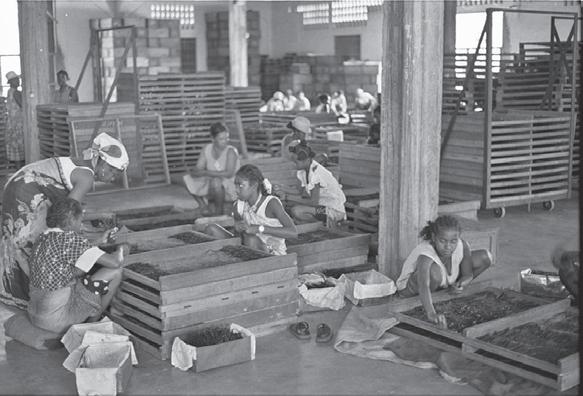
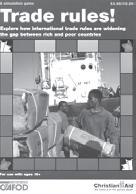
“By the end of the game, the rich countries realised they were rich and felt like giving some charity. So they came to offer us a helping hand: a pen. I told them to stick their pen... So much for the dialogue. But it was just a game anyway, wasn’t it?”
Jooa Vuorinen
A Fair Trade Role Play
The World Trade Organisation began in 1994 as a way of agreeing and enforcing international trade rules. Current world trade is governed by these rules which are agreed upon by member countries. In theory the institution is democratic and fair but in practice it is exclusive and perpetuates inequalities. Jooa discovered this and vented her rage in, yes, a game played at the Solidarity Conference in 2008.
‘Trade Rules! A Simulation Game’, is produced by Christian AID in the UK as a ‘hands on’ introduction to
The game reveals some of the dynamics of greed and power as they work in ‘the systems, institutions, and national agendas that drive international trade.’ It does this in a simple but engaging way. Tooled up with paper and scissors, the country teams produce goods to sell on the international market in time to buy air tickets to attend the next round of WTO talks. How many delegates you send depends on how rich your country has become. In the real world, rich countries are able to fund large permanent delegations with legal and technical expertise. Haiti, the poorest country in the western hemisphere was unable to send any delegates to the 2001 WTO Doha meeting whilst the EU sent over 500. One African negotiator at these talks said, “On an average day there are 10 or 12 meetings, on different issues, all starting at the same time. It is not workable. They know you are weak and you walk out frustrated. I’ve been attending meetings for four years and it is hard to write two lines about how my country has benefited”.
Indeed, as the game enters the second round you realise that the disadvantage can only be increased by the decisions made. However, the resource pack vents this frustration through reflective questions about the game, about our principles and our attitudes towards unjust institutions and about the reality behind the game. In reality questions about power, representation and equality are at the heart of trade reform and there are growing networks campaigning to protect the rights of the poor and calling for trade rules that help communities develop.
40
Resources – - Jooa VUORINEN & Roderick MORGAN: Play Shadows of an Unsettling Reality
The Father of Co-operation
Molly Scott Cato (MSC) and Richard BiCkle (RB), co-editors of a recent book on the legacy of Robert oWeN (1771-1858) published 150 years after his death, discuss the significance of the Welsh industrialist in his own age and today in an interview with Matt GaRdNeR (MG).
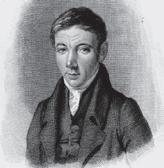
MG: What significance does
Robert oWeN have to research into the Co-operative movement?
RB: I think the most significant thing from the Co-op point of view about Robert OWEN was the enormously inspirational impact he had on the people who were to set up the Co-operative movement in the 19th century. He was a very successful philanthropic businessman. He was an autocrat and there was nothing all that co-operative about his activities, but he was an extraordinary social innovator. A pioneer of mass trade unionism, he invented the idea of local currencies, and he was an educational and industrial reformer. I suppose you might say he was a pioneering humanitarian. He believed that people were basically good and that the world could be remade.
MSC: He was quite patriotically Welsh I think, which is quite crucial for the Wales Institute for Research into Co-operative Studies, and he’s a completely unsung national hero. What I really like about OWEN was that he didn’t take anything for granted at all; he questioned everything. He was around at a time when capitalism was first
getting a stranglehold on the economy, and you could still look at the way money and work were organised and ask questions about what that would do to the human spirit and social justice. He came up with really interesting answers, and then he spent all his money trying to put those answers into practice. And the fact that everything he did in some sense failed is completely irrelevant I think, because he was bold and did interesting alternative things.
MG: oWeN had a wide range of interests, and the book reflects that, with chapters on education, community, food, and so on. Which do you think is the single most important topic, either to oWeN at the time, or to us today?
MSC: I think it’s about organising the economy in a different way. That was his central interest. He did start out in factory organisation, but beyond that, he started to look at the fact that value in the economy really changes with people’s work, and he tried to apply that to the organisation of productive activity, which is how he arrived at the co-op. I think there’s quite a lot that’s useful there for how we need to reorganise our economy in the 21st century.
RB: I think it was his educational ideas which were actually the best. MSC: They haven’t been influential though, have they?
Bickle is Research Associate for the Wales institute for Research into cooperatives at the cardiff School of Management. He has worked for a number of years in social enterprises and the cooperative sector, served on the board of directors of co-ops Uk and is the secretary for the society for co-operative studies. He is a member of the British ScM.
Molly Scott cAto is Reader in Green economics at the cardiff School of Management and director of the Wales institute for Research into co-ops. She has a degree in Politics, Philosophy and economics (oxford) and was spurred back into academia by her involvement with the environmental movement. Her research is around alternative and green economics, which includes work on co-operatives. Her blog is http://gaianeconomics. blogspot.com. She is a Quaker.
41
Richard
Robert Owen
RB: I think they have. I don’t think they’re always attributed to him, but I think that all the thinking behind early years education very much reflects his priorities. Ideas such as child-centred learning, which are still controversial, were pioneered and put into practice by him, as was providing classes for the adults working in his mills.

MSC: This is the difficult thing with OWEN - some people try to imply that there’s a continuous line between his thinking and radical things happening now, but it’s fairly hard to see that continuity. But that means he was in a way even more brilliant because he just sat there and thought up all these incredibly radical things in a whole range of areas. Certainly a lot of what he thought about seems terribly relevant today, like the issue of food supply - good quality food produced without exploiting people. He was living at the first wave of capitalism, when people were terribly exploited as producers and were sold crap food, and the Co-operative movement and governments responded to that and we went through an era where there was a lot more justice. Then, starting from the 1970s, we’ve had a lot more exploitation; so now we’re responding with some of the same kinds of ideas.
RB: I think the other striking thing that you find in a lot of early industrial writing was this incredible belief in progress, in the possibility for things to be different - hope in the future. That was a dominant intellectual theme for most of the 20th century, but from the 1970s onwards we’ve lost it – people today don’t believe that things will be better for their children than for themselves.
MSC: And they believe that people are greedy, selfish and stupid as well.
MG: What would you say about the relationship
between MaRx’s ideas and oWeN’s? Was MaRx fair to dismiss oWeN as a utopian idealist?
MSC: That’s an endless tension. I see it as socialism versus anarchism, Marxists versus Kropotkinites. OWEN himself was an authoritarian, but he wasn’t particularly good at building huge movements and organising people on a massive scale. What he wanted was these little communities, just like William MORRIS, GHANdI, KROpOTKIN and all those other people. Whereas the socialists went for big power structures, mobilisation of the masses and political power. And then they got corrupted and not much change happened.
RB: OWEN coined the term socialism, didn’t he?
MSC: Well so they say. But I don’t think he meant by it what it was turned into by the internationals. MARx was a very Germanic thinker, he was Hegelian, he thought in systems theory, he had that way of looking at the world, and he ended up as an economist writing all that down in great detail.
RB: Whereas OWEN wasn’t a grand theorist, he was a very practical person. He had a go at things. OWEN changed the community at New Lanark by being quite socially controlling – taking children away from their parents. But the people he inspired, with his ideas about getting education right and providing a toolkit to then be applied, had much more of an anarcho-syndicalist approach. OWEN didn’t try to control things for all time – he was on to the next thing. Before he had finished one project, he had the next big idea. Whereas actually the kind of movements that MARx inspired were much more organised and much more controlling.
MSC: You can also ask what has achieved more, has so-
42 Resources – Molly Scott CATO &
Richard BICKLE: The Father of Co-operation
Angus MACKIE
cialism achieved more than the Co-op movement? That’s an interesting question, because the Co-op movement has achieved a huge amount as an organisation that has become a mass movement.
RB: But equally, MARx was a very influential thinker. And it was also an incredibly energetic melting pot of ideas at the time. Much more so probably than we have today. MSC: And MARx’s social theory is just invaluable, isn’t it? OWEN did nothing like that.
MG: Could oWeN’s ideas be of any use in postcommunist countries where Marxism has to all intents and purposes failed?
MSC: Well the key thing about those countries is that there was a co-operative movement there, and it was destroyed by communism. They eradicated their own history of cooperation.
RB: In terms of consumer co-ops and retail co-ops, they survived throughout the communist era, but they became instruments of state planning. They were also quite useful tools, because they co-ordinated consumption and allowed goods to be distributed to local people, particularly in rural areas. But when communism collapsed, in some countries they were assumed to be part of the state and were privatised. In others, they were given back to the members, but there hadn’t been any democracy or participation for 80 years so people didn’t know what to do.
ered and they didn’t understand the value of their shares. When the economy collapsed, they sold their share in the factory for a loaf of bread, and thus Roman ABRAMOvICH and a small group of others now own everything because they bought everybody’s shares. It wasn’t intended as the privatisation that it became; it was intended as Co-operativisation. So I think the answer to your question is that there’s a very strong strand of mutual aid, self support and also self-provision in those countries, for example the dachas where they produce vegetables, and a lot of communitarianism as well, which could be turned into a useful economic form. And perhaps it is being. perhaps it’s just that capitalism was sold so strongly and with so much American ideological force following 1989 that that third way wasn’t given a chance. But from the level of the people, communitarianism does have a lot to offer.
RB: I don’t know a great deal about the socio-economic position of those transition economies. But I would be surprised if things like local currencies and time-based currencies – a barter economy effectively – isn’t actually in operation in a lot of places where the conventional economy collapsed. The interesting question now is whether that can be consolidated into a serious parallel economy which actually meets people’s real needs and provides a viable alternative to the market, or whether, a bit like in Europe and North America in the 1930s, as long as economic collapse continues it survives but then, once the mainstream economy gets itself going again which eventually it may, it either gets squashed and crushed, or just burns out.
MSC: When GORBACHEv looked at the Russian economy, and the chaos that resulted from socialist planning, he thought that the only way to deal with this was to create local co-ops – which effectively he did, because he gave the people who worked in the factories shares in their own factories. The problem was that people were disempow-
MSC: I don’t think the real economy’s going to get going again though, because of resource constraints.
MG: So what is a co-operative response to the current financial situation?
43
He came up with really interesting answers, and then he spent all his money trying to put those answers into practice.
RB: Well I think the first thing to note is that certainly in the UK the financial institutions which have gotten into trouble are not mutuals, not member-owned organisations. A lot of them were former mutuals that were privatised for shortterm profit and greed and then took reckless risks and lost their customers’ and investors’ money.
MSC: And that’s inevitable, because what capitalist businesses do is extract value and turn it into profit, so there’s less to go around. Then in harsher economic times that extra is just not available, and there’s much less for everybody. What’s been sucked out of the global economy is basically cash; so we ought to see an increase in informal systems of exchange, which might be exactly like the time bank that Robert OWEN proposed, or like his barter card where businesses exchange IOUs – I’ll provide something for your business if you’ll take photographs or do printing for me. In Argentina, when their money disappeared, that’s exactly what happened. There are all sorts of ways in which mutual solutions could help people through difficult economic times, but the real questions are these: do people believe in the goodness of human nature, and do people have the globalisation of skills and education to make these things work? At the time of Robert OWEN, there was a huge amount of self-education.
MG: is co-operation best working on a small scale, or is it practical on a very large scale? there is a story in the paper today about Mondragón, the huge co-operative in the Basque region.
MSC: The way I see this is that people start co-operatives up because they’re desperate, and then gradually the cooperative becomes more successful, and as it does it tends to move out of the control of the members. First you have representative democracy in the co-op and then beyond that it becomes so huge that members simply lose interest altogether, which happens a lot once you get to this sort of scale. But in a sense that doesn’t really matter, because now they’re an example for smaller co-ops to follow. And if the worst we had in the economy was this, I’d be really happy, because we wouldn’t have Tesco, we’d just have MonMondragón. And then we’d have our own little co-ops around; I can have my community farm, and so on, which is fine.
RB: If you look at the most visible part of the co-operative sector in Britain, the Co-operative Group, with a £12 billion turnover, all the profits from that enterprise are returned to members or returned to local communities or invested back in the business. This delivers real benefits to real people up and down the country. Because of the size and scale of that business, it has a representative democracy. Though you can be more or less cynical about how democratic it is, it is democratic on its own terms. The point is that it provides an infrastructure which can then support all kinds of small-scale community-owned village shops, up and down the country, by giving them equal buying power.
New Views of Society, edited by Richard BICKLE & Molly Scott CATO, is published by Scottish Left Review press (2008) and is available at www.scottishleftreview.org.
Further reading:
Wales Institute for Research in Co-operatives: www.uwic.ac.uk/ubs/research/wirc
Mondragon Co-operative Corporation website: www.mcc.es
44
Resources – Molly Scott CATO & Richard BICKLE: The
of Co-operation
The key thing about those countries is that there was a co-operative movement there, and it was destroyed by communism. They eradicated their own history of co-operation.
Father
WSCF Calls for Prophetic Voices in Our World: The 34th General Assembly in Montréal
Zuzanna BaBicova
It will happen afterward, that I will pour out my Spirit on all flesh, and your sons and daughters will prophesy. Your old people will dream dreams. Your young people will see visions. And also on the servants and on the handmaids in those days, I will pour out my spirit.
Joel 2:28-29
WSCF after four Years
The 34th General Assembly of WSCF met in Montréal, Canada, August 1-9, 2008 and gathered students from around the world, from one hundred and five associated and affiliated movements in WSCF’s six regions. The main task of the assembly was to review and assess the Federation’s work at all levels for the coming quadrennium. The global ecumenical community was represented in the gift of the denominational and geographic diversity present at the Assembly.
The GA happily affiliated four new movements – Brazil, Timor Leste, Mexico and Iraq – and celebrated the re-birth and reopening of the North America Regional Office. The North America Region hosted the GA for the first time in twentyeight years.
At the General Assembly we listened to regional reports from the six Regional Secretaries (North America, Latin America, Europe, Asia- Pacific, Africa and Middle East), summing up their work over the previous quadrennium. After listening to these reports and to testimonies from the national
movements of Myanmar, Zimbabwe, Iraq, Philippines, Cuba and Belarus, all had a better understanding of the different regions, their contexts and difficulties, and of the universal problems that all the regions and national movements face. We were assured by the Honorary Treasurer, who reported that WSCF’s finances had stabilized after the difficulties of the 1999-2004 quadrennium. The GA found WSCF to be in good financial condition at the end of the 2004-2008 quadrennium.
The Programme and Tasks
Two days before the General Assembly officially started, the delegates met in the Women’s and Men’s Pre-Assemblies. The main objective of the Women’s Pre-Assembly was to encourage dialogue and to empower women for participation. It included a trip to the Canadian Senate chambers in Ottawa for a discussion with Nancy Ruth about women, power and politics. The Men’s PreAssembly discussed the meaning of masculinity in today’s world and took up the challenge of the “Men against Violence” campaign. These gender caucuses largely served to empower women and to give space to discuss gender justice, an issue that affects every aspect of the Federation’s work. A wide range of exposure trips were planned for delegates. We could choose one from the thematic trips offered in Montréal: Women in Montréal, Organic Farm, Gay village, Indigenous Peoples. Each day of the General Assembly was accompanied by a midday Eucharist service and bible
Zuzana BaBicová (1986) is from Slovakia and studies English and German at the commenius University of Bratislava. She is currently a member of the board of cESR and the coordinator of Ekunet. Some of her favorite things to do include visiting art galleries and reading books.

45
studies that brought together small cross-cultural groups to discuss and reflect on set passages from scripture. Morning worships were led by one of the six regions of WSCF and portrayed our diverse liturgical traditions and theological perspectives.
We, as the Assembly, had the responsibility to elect a new Executive Committee and General Secretary for the next quadrennium. In addition to the elections, many consensus decisions were made. Consensual decision making is often a very lengthy process, but it also is a very empowering experience of student and movement leadership and very appropriate since we, the Student Christian Movements, create the essential core of WSCF. Throughout the week, keynote speakers challenged us to be prophetic Christians in today’s world.
Paving a prophetic Path of common Visions
The General Assembly formed four commissions including delegates, resource people, guests and senior friends. The commissions met throughout the General Assembly to reenvision the mission of WSCF. The four commissions were Raising up Prophets (Ecumenical Leadership Formation), Prophesy in Action (Advocacy and Solidarity), Radical Renewal (Biblical and Theological Reflection in the 21st Century), and Making the Vision Real (Capacity Building in the Student Christian Movement). Different themes emerged from the commissions’ work and, following the example of the previous quadrennium, the regions may all adopt the WSCF annual themes for the 2008-12 quadrennium.
As we all came from such diverse geographical and confessional backgrounds, the experience in these commissions for our unity, prophetic visions and common good were enriching and challenging, but we also occasionally felt a bit lost in our diversity. All, however,
made sincere attempts to comprehend the background and honest intentions of others, even if differing conclusions were reached in some areas. In this way, our work was a true experience of ecumenical learning based on listening.
The work of the commissions was synthesised by a special committee into the following themes for WSCF for the coming quadrennium: interfaith engagement, environment and climate change, the Bible, economic justice (poverty, food crisis, fuel), diversity and discrimination (ethnic, indigenous, religious, sexual).
In addition to annual themes, the challenge of gender justice seemed to be of ongoing interest throughout WSCF’s work and is a priority requiring commitment. This will be a key project and will include the evaluation of the current status of our work for women´s empowerment and gender justice.
Senior Friends in Cooperation with Youth
At this General Assembly more than fifty Senior Friends gathered in a parallel meeting to share their experience and memories from their time in the WSCF. It was very beneficial to know how WSCF looked in the late 60´s, and to hear about events like the influential Turku student conference of 1968. Their wisdom and stories, shared during speeches and discussions, deepened our view about the history of WSCF and better enabled us to envision the future.
The senior friends were also willing to support us (regional movements) in many ways. All students were offered help from Senior Friends and we began to think about how to trace this journey together.
46 WSCF in Focus – Zuzanna BABICOVA: WSCF Calls for Prophetic Voices in Our World
Being a Prophet in our World
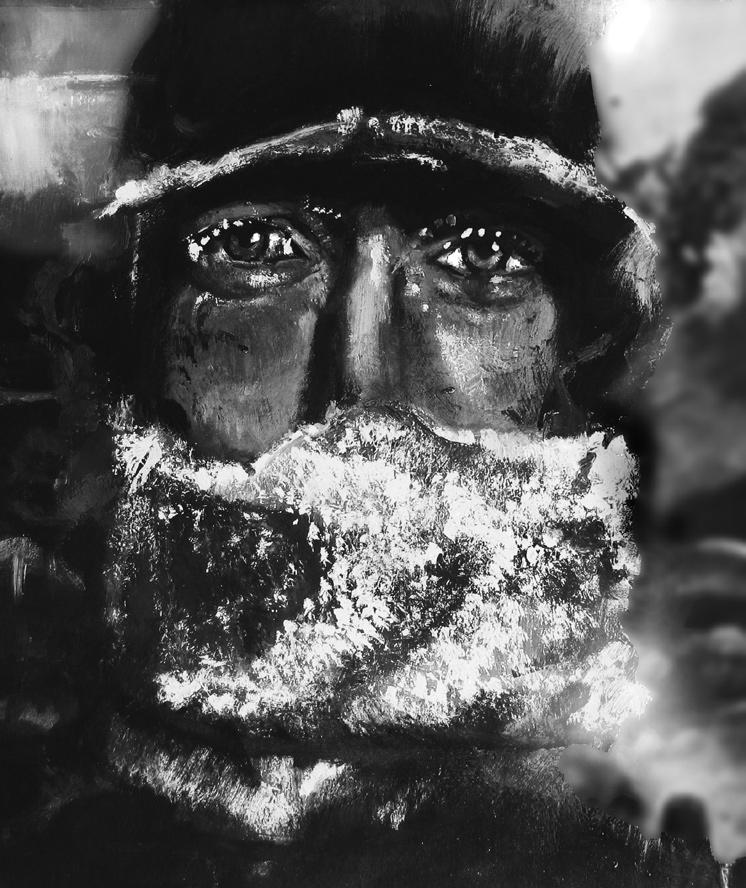
At the end of the General Assembly each of us felt part of a large global ecumenical community with a long history and much potential for today. After experiencing such a global gathering and seeing people working for common good and for our unity, one begins to feel more committed to the work of WSCF. The various issues that we were dealing with were addressed to us, to radical Christians and prophets that shall prophesy in the world today.
At the closing worship, we listened to encouraging words, helpful to any who deal with burning issues and hear the challenge of the prophetic call. During the worship, Martin Bonde CHRISTENSEN from Denmark commented on Matthew 25:14-29: “We all have talents, some of us are prophets, some are preachers, some are healers, and some of us have wisdom, but we are all God´s servants. And that is a huge responsibility. In a Danish hymn, we hear the following words: The God of life has no hands, therefore he sends you, when your neighbour is in need.”
We all felt strengthened and encouraged to take up the responsibilities given to us as prophets, caretakers, preachers and healers: “For the God has no hands, therefore he sends you, when your neighbour is in need.”
47
“We all have talents, some of us are prophets, some are preachers, some are healers, and some of us have wisdom, but we are all God´s servants.“
A Just Change – Adivasi Tea Project
Mari THEKAEKARA
The Need for Change
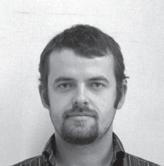
Just Change has special relevance today as the economy is crashing globally and conversations are filled with depressing discussions about recessions, unemployment, lost pensions and savings. To start at the very beginning, however, Just Change was inspired by Fair Trade and created to help the Adivasis, the indigenous people of the Gudalur Valley in South India, get a fair deal for their tea, grown with sweat, hard work and heavy labour but also with dignity and pride.
In 1987 life changed for the Adivasis. They began a journey through small tea gardens, bondage and penury, to a life of economic dignity and self reliance. Suddenly in the late 1990s the

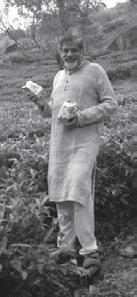
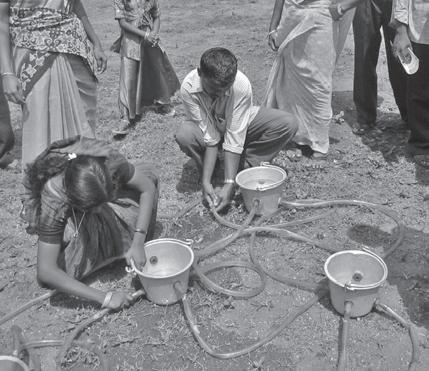
price of tea crashed and with it their dreams. “Why?” we asked, perplexed. “The consumer in India, Germany or the UK continues to pay the same price for the tea that they drink. Even the poorest, unemployed person in the West pays more. So why does the farmer get less?”
The company which exported the tea to the EU or British supermarket never lowered the price even if the worker on the tea plantation had to take a wage cut. Fair Trade organisations in Germany, GEPA and El Puente gave a better price, but led us to ask why our friends in Germany should pay more because they want to help?
We decided to link the farmer directly with the consumer so that both sides received a fair deal. A fair exchange seemed to be a much better idea. It brought “justice” into the act, taking it a step further from kindness, benevolence and charity. It made fair trade fairer. We called this Just Change.
In the Beginning
Just Change began in Gudalur, in the Nilgiri Mountains of South India, when Adivasis banded together in 1988 to form the Adivasi Munnetra Sangam to fight for their rights. We were joined by other groups intrigued by the idea of linking poor farmers, producers and consumers. Currently Just Change consists of five groups from Tamil Nadu, Kerala and Orissa in India and several consumer groups in Germany and Britain.
One of these groups is the “Adivasi Tee Projekt” (ATP), a group of volunteers from the ESG (Evangelische StudentInnengemeinde in der Bundesrepublik Deutschland) network all over Germany. These volunteers make Just Change work. Since 1994 their network of up to 50
MOZAIK 22 48
A game with leaky buckets, which is used to help illustrate the concepts behind Just Change
Stan THEKAEKARA, an initiator of the Just Change concept, at Adivasi tea estate
Mari THEKAEKARA works with Just Change and is based in Gudalur, India.
volunteers has had a close personal as well as institutional relationship to the Adivasi in Gudalur valley. ATP organises informative events and programmes with the Adivasi and Just Change. They also regularly invite Adivasi to Germany to speak for themselves. In this way ATP connects the producers with the consumers in Germany and also cooperates with One World Shops, student companies and church communities as well as with families and friends of the Just Change idea.
Current Developments
Our first product was Gudalur tea and we have expanded to include handmade soaps, and plan to add spices, lentils, banana chips, cashew nuts and possibly coffee. In India we are trading tea, coffee, a basket of spices, black pepper, rice, coconut oil, umbrellas and a number of other products.
A millionaire friend pointed out that in order to succeed, Just Change needs to include concerned investors also. He then proceeded to fund Just Change for a year. This brought in the dimension of including investors who shared our ideals and vision. So Just Change is now a cooperative of producers, consumers and investors. It is a step towards dealing with globalisation on our own terms. In short, to Just Change it!
Watch for more information and get active. Participate in our global network as a consumer or investor or support our idea and practical work through your commitment. Let’s change the world.
• Just Change India: www.justchangeindia.com
• Adivasi-Tee-Projekt, Germany: www.adivasi-tee-projekt.org
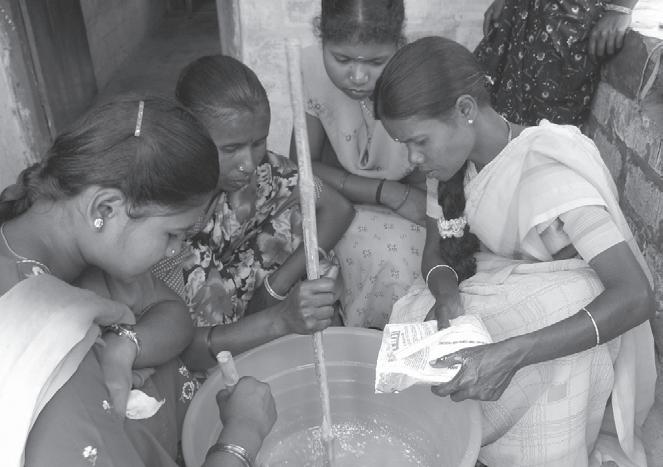
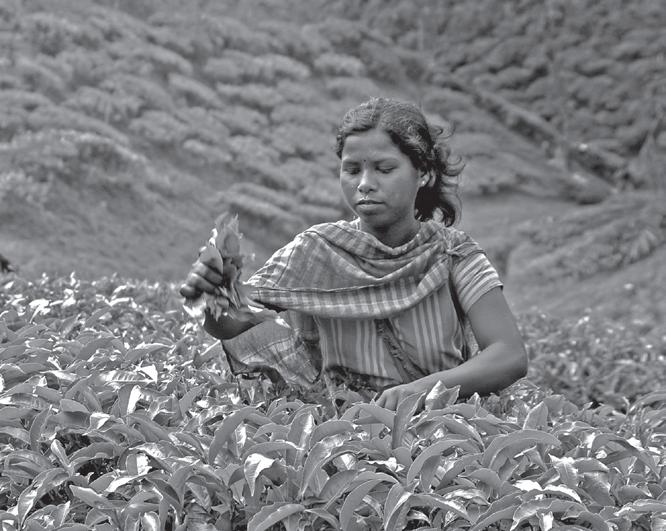
• Just Change UK (Großbritannien): www.justchangeuk.org
• Just Change France: www.justchangefrance.org
49
www.sxc.hu
Is God political? Notes on a Theology for the Survival of the Earth
Klas Corbelius
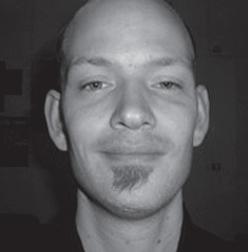

What does it mean to be a Christian today? In our highly competitive society where we are graded, labelled and often seen only as consumers and workers, what does it mean to be a Christian? Can Christianity provide a different kind of identity? If Christianity should seek to be an alternative to society, what kind of alternative should it be? These questions have arisen from a lifetime of involvement in the Church, with its traditions and rituals. While observing the prayers and practices, one begins to question the kind of space that one inhabits. How do these things reconstruct our identity and what secret makes the church different? These questions led me to write a book, entitled I Mommons Tid (In the Time of Mammon).
The Gift and the Problem of the Church
First, I should begin by telling you the personal story of how I discovered the gift of the church and how I became aware of its problems. When I was seven, because of a girl, I started to go to the youth group in my local parish in the Church of Sweden. I continued attending long after she left because I had made friends there. At the same time the leaders spoke powerfully of the love of God; it was not only in their words but also in their constant kindness. This contrasted with competition that was taught early in school.
Not only was there the pressure of tests but, even worse, the exposure of sport and gymnastics. I can still remember the feeling I had every time I was chosen last for soccer teams, “alright, you can have him”. So from the beginning faith was not only a matter of theory but first of practice. Our treatment of each other is a sign of our faith and God’s love.
Still there were problems and things became more complicated in high school. I wanted to go further; I wanted to pray and act for justice. I wanted to change society and to undo injustice; I did not understand the apathy of those who knew about injustice but did nothing to change it. At church the minister would preach about loving your neighbour but did not criticise politicians and corporations that failed the command and created injustice. A sermon might talk highly of peace and forget the stocks the church owned in the weapons industry.
Politics and Faith
The common opinion was that faith and politics were two separate things that should not influence each other. That idea seemed strange to me. If faith has meaning and significance for all human life, than it must also apply to politics. This idea seemed to suggest a very different interpretation of Jesus and Christian life than my experience allowed.
In Jesus, God became a human being and walked about on earth with ordinary women and men. He ate and drank, laughed and cried as we do;
MOZAIK 22 50
Klas CORBELIUS, General Secretary of SCM Sweden, is the author of I Mammons tid (In the time of Mammon).
he raged against injustice and gathered the excluded and oppressed to himself. He was born not in a palace but in a stable, and after he was executed by the Roman Empire he was buried secretly and mourned by friends and disciples. Jesus taught by his actions and by stories of God’s rule in everyday life and work. So when others tried to silence the blind man, Jesus healed him. Whilst the disciples wanted to send the 5 000 men away, Jesus took care of their needs and fed them. Many did not dare to touch the unclean leper, but Jesus healed him and restored him to society. In Jesus we see that faith is known in practical works of love. For those who witnessed Jesus’ teaching and actions, he was troublingly political. Many today are rediscovering this aspect to Jesus’ life, death and accession.
Jesus perhaps spoke about justice to the poor more than any other thing. The Bible includes more than 2500 verses about poverty and justice. Indeed Jesus begins his ministry by announcing that his mission is “to proclaim good news to the poor, liberty to the captives and recovery of sight to the blind, to set at liberty those who are oppressed” (Luke 4,18-19). We can easily miss the importance of economic justice in Jesus’ teaching, but the whole preaching of the kingdom depends on it and is taken up with a vision of justice and compassion: the rich young man is told that he can have no share in it unless he gives up his riches and shares them with the poor whilst others are promised the Kingdom and Heaven for the gift of a cup of water. In Matthew’s parable of the sheep and the goats, knowledge of God and obedience to the coming Christ rests entirely
on responding to those in need, “Truly, I say to you, as you did it to one of the least of these my brothers, you did it to me” (25,40).
We forget the literal meaning and significance of these sayings when we fail to put them into practice, but the primitive Church took these teachings of Jesus literally. They sold their possessions, giving them to the community and to the poor; they lived in commune, sharing every thing on the basis of equality and need. The greatest sin and deceit against the Holy Spirit recorded in the Acts of the primitive Church was hiding property and refusing to share things in common. James, writing from this early community, makes it clear that those who take pride in their riches and do not help their sister or brother in need have no part in the grace of Christ or the Church.
As time went on Christians did not continue to live in commune, but their meetings and activities still centred on justice to the poor and the neglected. The collection of money during the Eucharist today might be traced to the collection for widows and orphans in the Acts Church and the collection in the Pauline Churches, sent to relieve the Church in Jerusalem that was suffering from famine. Early Christians are known to have rescued orphans and the virginity movement was as much about liberating women from the economic and power relationships of pagan marriage as it was about ideas of sexual purity. Likewise, early Christians took a firm stand and opposed the whole nature of Roman society, from refusing to go to the barbaric games to refusing to take part in the idolatry and injustice of the trade guilds. Like Jesus they also refused violence and military service. For all of this they suffered suspicion, persecution, imprisonment and even death.
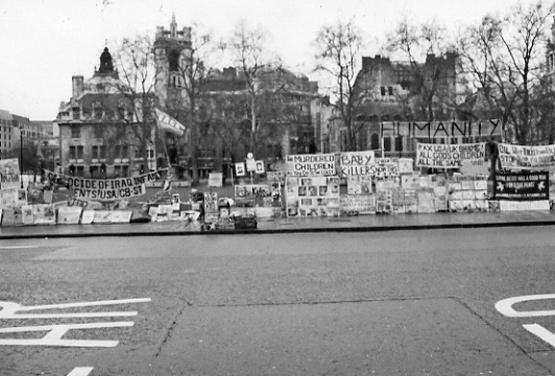
51
The common opinion was that faith and politics were two separate things that should not influence each other.
Towards the Kingdom
Justice to the poor, peace and nonviolence are vitally important in our contemporary world and it is as disciples of Jesus with a vision of the coming Kingdom that we are able to find new ways of living and acting for a more just and humanitarian future. The gift of the Spirit is the gift of the Kingdom. As Christians this gives us not only an imagination to see how things can be different but also hope that, whatever the short term effectiveness of violence and injustice, justice and compassion will win in the end because Christ rules all.
This gift is known and celebrated in the meeting of the Christian community. While listening to a sermon or gathering around the table of the Lord’s Supper, we hear rumours of the New Jerusalem and taste the Kingdom feast. Fed with the Spirit, Christ rules in us and the whole community acts out a different way of being and sharing that becomes a place of transformation not only for the church but also for society. The church becomes the centre of a militant society, where we each receive the freedom and support to fulfil our mission in the world. When Paul talks of the Church as the Body of Christ it is not just a metaphor, an image, but a living reality. It is only when our churches become centres of an alternative reality that we will be able to fulfil our mission to be a transformative and liberating presence in the world.
In our time the Church faces new challenges and new opportunities. If we have lost a sense of the radical call and resources of our tradition, if we have lost a sense of our responsibility to our fellow human beings and our orientation to the coming Christ and our life in the Spirit,
than we must wait on God in prayer. In preparing to resist Hitler and the Nazi regime, the German theologian Dietrich BONHOEFFER (1906-1945) said that only two things were needed: prayer and love of neighbour.
The duty of ministry and of our churches is simple and two-fold: firstly to teach basic spirituality (how to pray) and secondly to teach basic discipleship (how to love). They are the beginning and all that is needful for Christian life. To discover them they first require us to follow Jesus into the desert. The desert is a place to struggle with God and temptation, to commit wholeheartedly to the Gospel and receive our vocation. The whole of Christian worship, calling, forgiveness, word and promise, intercession and praise are all designed to open us to the teaching and guidance of the Spirit, to the joy and responsibility of life and community. Especially during advent and lent, we create a sort of desert, a retreat and a home of the soul.
Jesus taught, “No one can serve two masters; for a slave will either hate the one and love the other, or be devoted to the one and despise the other. You cannot serve God and mammon.” In this community and in this space we learn to be free of wealth and the greed and injustice that go along with it and to serve only God and live in equality and justice with our brothers and sisters in the world. Here students and activists, theologians and church leaders, along with politicians, stock brokers, bankers, managers and workers join together in the Body of Christ and enrol in the service of the Kingdom of God. Let us not take this Body or this service for granted but let us act together for peace and justice and become the alternative and compassionate community we are called to be.
52 Last Things – Klas CORBELIUS: Is God Political – Notes on a Theology for the Survival of the Earth
If we have lost a sense of the radical call and resources of our tradition, if we have lost a sense of our responsibility to our fellow human beings and our orientation to the coming Christ and our life in the Spirit, than we must wait on God in prayer.
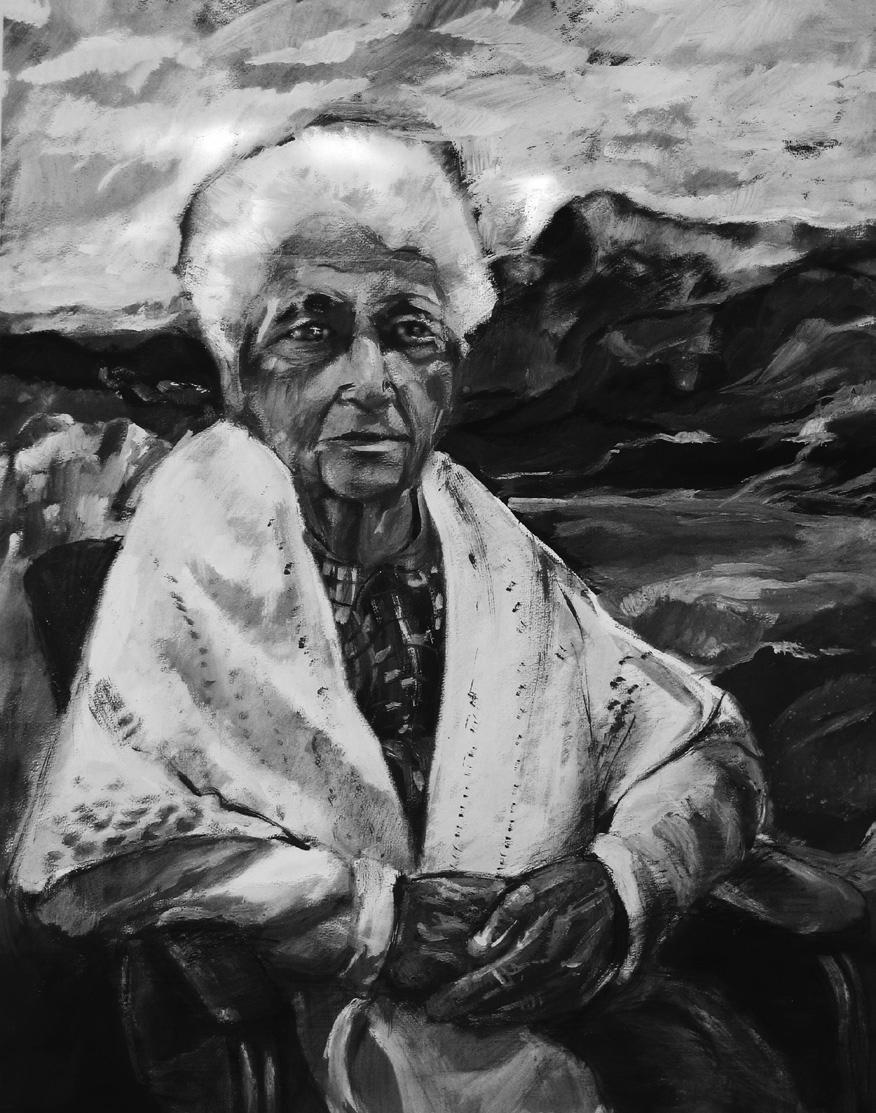
53
Lead Kindly Light –An Examination of Conscience
“And spurned on by the method to return to myself, I entered into my deepest interior, led by You. There I was in a state such that You became my helper. I entered and looking with my mind’s eye – how weak it is – I saw above this eye, above my spirit, a constant Light.” St Augustine, Confessions
Some medieval theologians and mystics taught that God is the Light by which our souls see and interpret the world, by which we know ourselves to be made in the Image of God, having a share in God’s creativity and grace. This Light illuminates the way we think about life, use the gifts of creation, and love our neighbour. First we must begin the journey inward guided by Jesus, who is also the teacher within us (the Light that enlightens every mind), who first challenges our will and examines our motives and attitudes to the world and is finally that Light which makes us just and prepares us for the Kingdom of God.
Inspired by Augustine’s thought and a reading of Matthew 25.1-13, this meditation is also informed by the Exercises of St Ignatius. The essential part of the Exercises is the examination of conscience, which helps us to discover how God has been present throughout our day and to discover areas of our lives that need further growth and healing. This is an evening meditation that should be led by one calm and patient voice. It is best not to be either too hurried or too intense. Whilst people gather some quiet music can be played in the background. Before the meditation begins another voice may read Matthew 25.11-3 or the meditation can begin immediately with the verse:
Watch therefore, for you know neither the day nor the hour in which the Son of Man is coming.
All pray together: God, unto whom all hearts are open, all desires are known, from whom no secret thing is hidden, we ask you to cleanse the purpose of our hearts with the unspeakable gift of your grace that we may perfectly love you and worthily praise you.1 Amen
The facilitator slowly invites the participants to relax and become open to God by first becoming aware of their surroundings, of the weight of their bodies, and by letting go of mental distractions before finally concentrating on their breathing. After this the facilitator invites them to become aware of the light of God within them...
1) Ask God to kindle the fire of God’s light in you and help you to examine your inward self so that you can be free of those things that cloud the Image of God in you and sto you from reflecting the Light of Christ’s justice in the world.
2) Give thanks to God for the good things that you have received. Reflect on what has happened today that has made you aware of the Image of God in creation, humanity, and in yourself.
3) Begin to examine your inward self by remembering your day, from the moment you woke until the present, hour by hour, period by period:
a) Examine your thoughts:
- What was your first thought upon waking?
MOZAIK 22
54
- Did anything prevent you from seeing God in your work and in the people you met?
- Did you allow money or other worldly things to become your priority or to separate you from others?
(These questions are only suggestions; try not to cover too much in one meditation.)
b) Examine your words:
- Did desire or the demands of work stop you from speaking the truth?
- Did you use words to welcome the stranger and understand the excluded?
- Did you fail to be a voice for the poor and oppressed?
c) Examine your actions:
- Have you used your time and money justly, respecting the labour and needs of others?
- Have you acted without being aware of your effect on the environment and the human family?
- Does your work and lifestyle express your creativity and share in the creativity of others? What is your gift?
4) Invite participants to ask for forgiveness and imagine the Light of God now kindly purifying their inward selves and restoring the Image of God within them.
5) Finally invite participants to resolve to live more soulfully with their eyes more closely on the Kingdom and to ask God’s grace and guidance in this.
And close with this prayer, saying together: Lord, Jesus, Wisdom from the Father, Give us a share in your wisdom, That we might think, speak and act
According to your goodness
Every moment of our lives. Save us from being led into the Company of evil; from selfish works And from words that destroy. Have mercy on your creatures And compassion on me, a sinner. Amen 2
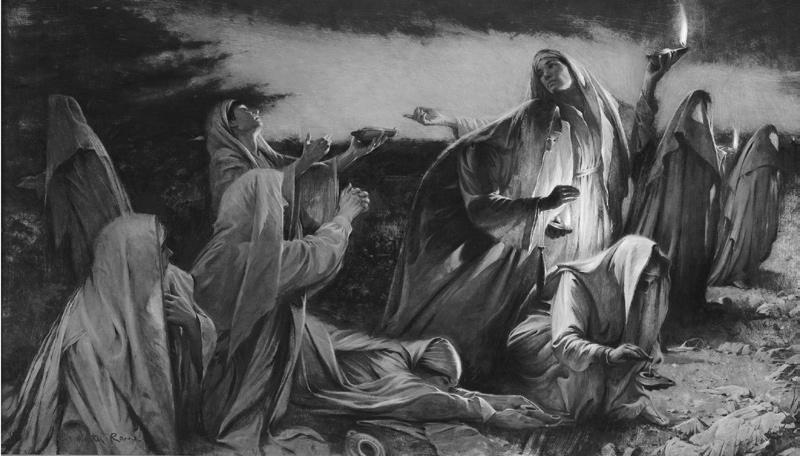
A song may be sung and before departing the participants bless each other: May the grace of our Lord Jesus Christ, and the love of God, and the fellowship of the Holy Spirit be with us all ever more.
Amen
1 From the ‘Cloud of Unknowing,’ a medieval English mystical manual.
55
2 Adapted by Andrew Scott and Emma Sargsyan from the Armenian Orthodox Liturgy for Holy Tuesday.





 Matt Gardner
Matt Gardner



 Jooa VUORINEN was born in North Carelia, Finland, in 1981. She studied theology at the University of Joensuu and graduated with master’s degree in 2005. She has been working as the European regional secretary of WSCF since January 2008.
Roderick MORGAN was born in the Welsh Valleys in 1989. He reads Peace at Bradford University and is in his second year. He campaigns on behalf of Christian Aid and Amnesty International.
Jooa VUORINEN was born in North Carelia, Finland, in 1981. She studied theology at the University of Joensuu and graduated with master’s degree in 2005. She has been working as the European regional secretary of WSCF since January 2008.
Roderick MORGAN was born in the Welsh Valleys in 1989. He reads Peace at Bradford University and is in his second year. He campaigns on behalf of Christian Aid and Amnesty International.















